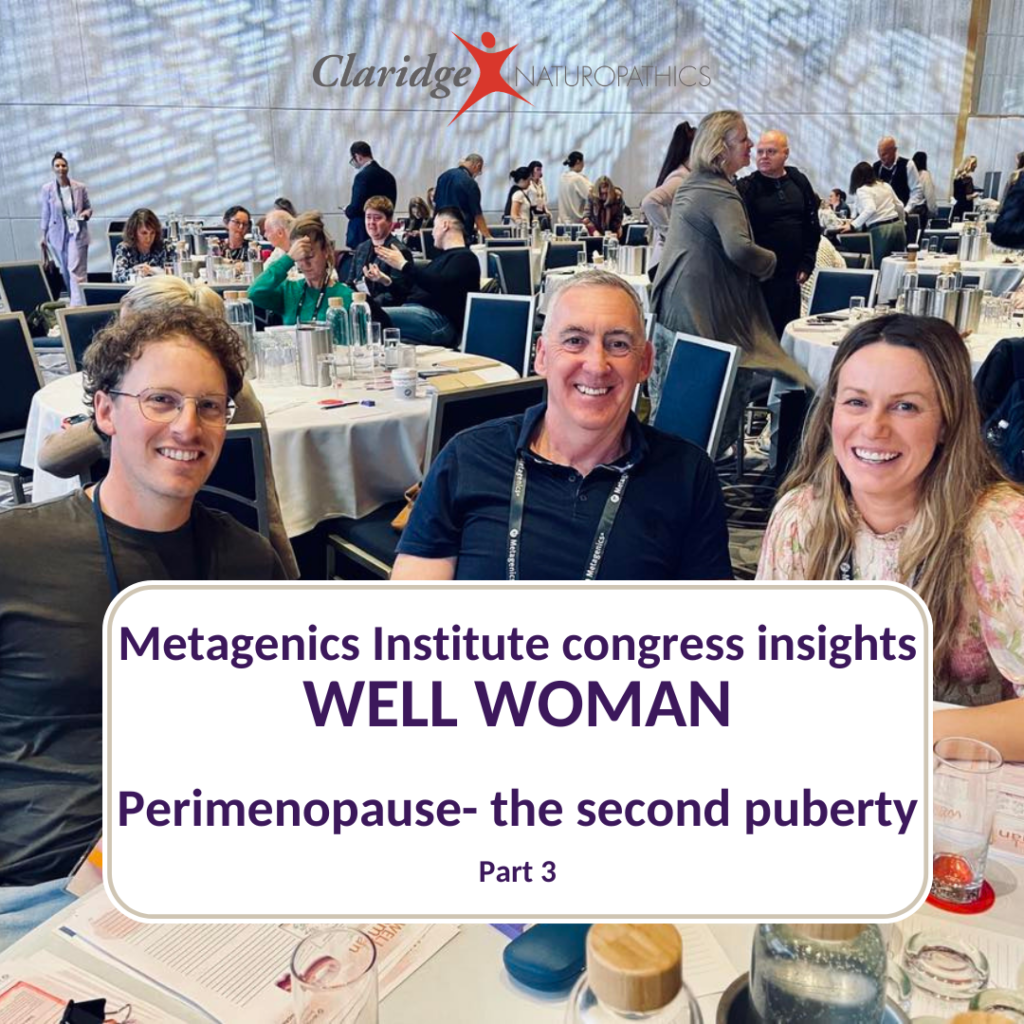Claire Hosking N.D.
Specialist Naturopath – Holistic Nutritionist – Herbalist
TOPIC 3- PERIMENOPAUSE, THE SECOND PUBERTY
Over the June long weekend, I was fortunate to join the Metagenics Congress in Sydney with Rob and Matt. Over the two days, we focused on Women’s wellness and the treatment of complex female conditions. We heard from various experts from Australia and around the world.
As you may be aware, women’s health is what drives and inspires me in my daily practise. The congress focused on unraveling the complexity of women’s’ health problems especially with respect to hormones. Women’s hormones fluctuate during all stages of their lives and require multifaceted management.
Considering the insights and learnings I gained from the Congress, I thought I would share some of these with you across several installments.
The third and final installment is on ‘Perimenopause – The Second Puberty’, presented by Dr Lara Briden.

PERIMENOPAUSE- THE SECOND PUBERTY
Who doesn’t love Dr Lara Briden?
Lara Briden is a Naturopathic doctor, with more than 20 years’ experience in Women’s health.
Dr Briden is also the best-selling author of ‘Period Repair Manual’ and ‘Hormone Repair Manual’ which I cannot recommend these books more highly.
Dr Lara’s presentation went deep into the conversation around perimenopause being a neurological transition. During this time the female undergoes a conversion from one state of developmental ageing to another, as seen during early childhood to puberty, pregnancy, postpartum and perimenopause. In Lara’s words, we could think of menopause as a second puberty where hormonal change influences neurological function.
Perimenopause is said to start 2 – 10 years prior to menopause and is a time of fluctuating oestrogen and low progesterone. Menopause is the life phase that begins one year after the final period. It is the time of low oestrogen and, in a healthy context, yields little to no symptoms.
In the years leading up to menopause, progesterone is the first hormone to decline. Progesterone is calming and nourishing to the brain. Not surprisingly, research has found lower levels to be associated with a higher perceived stress and increased risk of depression and anxiety.
An interesting fact, from Dr Briden’s presentation was that during the time of perimenopause, our brain enters a temporary energy crisis particularly associated with decreasing oestrogen. Given that oestrogen works to increase insulin sensitivity, having less oestrogen results in less fuel entering cells and subsequent decreased energy. The brain has the most energy demands so it is the first to show effects from this state of reduced fuel leading most obviously to poor cognition and mood change.
Given the potential impact of declining oestrogen, the brain is forced to recalibrate. According to Lara’s research, in the absence of an optimal insulin dependent fuel system, the brain tries to increase another fuel source called ketone bodies. Ketones are sourced from metabolism, however, can be difficult to access when low metabolism and poor diet prevail. If ketones are unavailable, brain cells may resort to cannibalizing their own myelin as a source of ketones. i.e. in other words the brain starts to eat itself!
With regards to perimenopause and menopause, it is important to remember that this is transitional and temporary. This is a journey that the brain must take to lead it into its next stage of life just like it did when it went through puberty.
The reason I share this is when I see clients in the climax of perimenopause they can feel like life will never be normal again. However, understanding the rules of the game allows it to be played better. Furthermore, there are many ways to support this process so that it can be a smooth rather than tumultuous time. Here are some of the ways that the body can be supported during this time of brain rewiring?
- Ideally, we need to think about soothing our nervous system – this may be exploring practices in mindfulness and breathing. This can include getting out in nature or taking up a creative hobby such as arts or pottery.
- Reduce/quit alcohol – not what many people want to hear this, but unfortunately alcohol is not supportive to the brain and thus needs to be eliminated as much as possible. Thankfully there are many great non – alcohol drinks now available.
- Move your body and build muscle – exercise helps to improve insulin sensitivity and support our bone health, (which oestrogen has also protected our whole reproductive years)
- Support blood sugar balance by incorporating the correct ratio protein, fats and the carbohydrates into your diet.
- Connect with other women in your community – it is important to talk about what you are experiencing to helps support yourself and others that may be going through perimenopause and menopause.
I have always loved reading and listening to Dr Lara Briden. I feel that she is really helping to change the narrative around perimenopause and menopause. It seems we can get so caught up in the symptoms of menopause that we lose sight of why they are there and more importantly that we can influence this why!
The idea that menopause is a second puberty is fascinating, and hopefully leaves you with some understanding about the transition you and your body are going through. Stay tuned for a more details on Perimenopause and Menopause as part of my Hormone Program.
If you have any further questions on any hormone relates issues or concerns, please call our reception team on 03 5221 8220 to make an appointment.
I would love to discuss how Naturopathy can support you.
In health and happiness,
Claire
